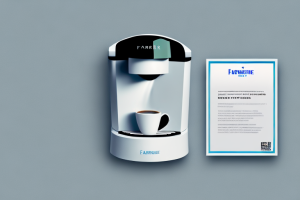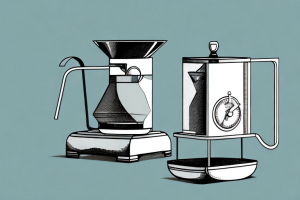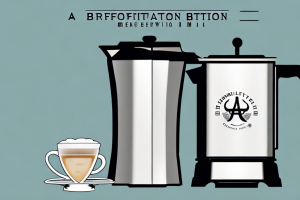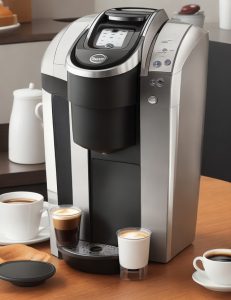Descale Breville Coffee Maker

A breville coffee maker with a descaling process taking place
If you’re an avid coffee drinker, chances are you own a Breville coffee maker. This sleek and stylish appliance not only looks good on your kitchen counter, but it also brews a mean cup of coffee. However, even the best coffee makers can develop mineral deposits and hard water buildup over time, which is why descaling is an important maintenance task.
Why descaling your Breville coffee maker is important
Mineral deposits and hard water buildup can clog the internal components of your Breville coffee maker, affecting its performance, and ultimately, the taste of your coffee. Descaling your coffee maker regularly can help keep it functioning at its best and ensure that you continue to enjoy high-quality coffee.
Additionally, descaling your Breville coffee maker can also extend its lifespan. The buildup of mineral deposits can cause damage to the heating element and other internal components, leading to costly repairs or the need for a replacement. By regularly descaling your coffee maker, you can prevent this damage and save money in the long run.
Signs that your Breville coffee maker needs descaling
If you notice that your coffee tastes off, the machine is brewing slower than usual, or the brew temperature seems lower than normal, these could be signs that your Breville coffee maker needs descaling. Other visible signs of mineral buildup on the machine include discoloration of the heating element or the coffee maker’s internal components.
Another sign that your Breville coffee maker needs descaling is if you hear unusual noises during the brewing process. This could be caused by mineral buildup obstructing the flow of water through the machine. Additionally, if you notice that the water reservoir is not filling up to its usual level, this could also be a sign of mineral buildup in the machine.
Regular descaling of your Breville coffee maker is important to maintain the quality of your coffee and the longevity of your machine. It is recommended to descale your machine every 3-6 months, depending on usage and water hardness. You can use a descaling solution specifically designed for coffee makers or a mixture of vinegar and water to descale your machine.
What is descaling and why is it necessary for coffee makers
Descaling is the process of removing mineral deposits and hard water buildup that accumulate over time in coffee makers. This buildup can affect the temperature of the coffee maker’s heating element, clog the machine’s internal tubing, and ultimately impact the taste and quality of the coffee it brews. Descaling is necessary to keep your coffee maker functioning properly and ensure high-quality coffee.
There are several methods for descaling a coffee maker, including using vinegar, citric acid, or specialized descaling solutions. It is important to follow the manufacturer’s instructions and use the appropriate descaling solution for your specific coffee maker to avoid damaging the machine.
Regular descaling can also extend the lifespan of your coffee maker and prevent the need for costly repairs or replacements. It is recommended to descale your coffee maker every three to six months, depending on the frequency of use and the hardness of your water.
Different methods of descaling a Breville coffee maker
There are several methods of descaling a Breville coffee maker, including using descaling solution, vinegar, or citric acid. Some coffee makers also have a descaling cycle that automatically runs the descaling process.
The descaling solution is a specially formulated liquid that is designed to remove mineral buildup from the coffee maker. It is available at most home appliance stores and is easy to use. Simply mix the solution with water and run it through the coffee maker according to the manufacturer’s instructions.
Vinegar is another popular method of descaling a coffee maker. It is a natural and inexpensive alternative to descaling solution. To use vinegar, mix equal parts of vinegar and water and run it through the coffee maker. Be sure to rinse the coffee maker thoroughly with water after using vinegar to avoid any residual taste.
How to properly prepare your Breville coffee maker for descaling
Before descaling your Breville coffee maker, it’s important to prepare the machine by removing any leftover coffee or coffee pods. If your machine has a removable water tank, empty it and refill it with water. It’s also important to refer to the user manual for specific instructions and recommendations for your machine.
Additionally, it’s recommended to run a cleaning cycle with a cleaning tablet or solution before descaling. This will help remove any buildup or residue in the machine and ensure a more effective descaling process. Follow the instructions on the cleaning product carefully and make sure to rinse the machine thoroughly afterwards.
Step-by-step guide to descale your Breville coffee maker
To descale your Breville coffee maker, follow these steps:
- Fill the water tank with descaling solution or a vinegar and water solution according to the manufacturer’s instructions and the strength of the descaling solution.
- Place a container capable of holding all the water from the water tank under the coffee maker’s spout.
- Turn on the coffee maker and allow it to run the descaling cycle.
- Dispose of the water in the container and refill the water tank with fresh water.
- Run the coffee maker with fresh water to rinse out any remaining descaling solution or vinegar.
- Dispose of the water in the container and repeat the rinse process until the water runs clear.
It is recommended to descale your Breville coffee maker every three to six months, depending on the frequency of use and the hardness of your water. Hard water can cause mineral buildup in your coffee maker, affecting the taste and quality of your coffee. Descaling your coffee maker regularly can help prolong its lifespan and ensure that you always enjoy a delicious cup of coffee.
Tips and tricks to make descaling your Breville coffee maker easier
Make descaling your Breville coffee maker easier by using filtered water in your machine, which can help prevent mineral buildup. Additionally, it’s recommended to descale your coffee maker at least every three months to ensure effective performance. And lastly, always follow the manufacturer’s instructions when preparing and running the descaling cycle to avoid damaging your machine.
Another tip to make descaling your Breville coffee maker easier is to use a descaling solution specifically designed for coffee makers. These solutions are formulated to effectively remove mineral buildup without damaging the machine. You can easily find these solutions online or at your local home goods store.
It’s also important to regularly clean your coffee maker to prevent mineral buildup and ensure the longevity of your machine. This includes wiping down the exterior with a damp cloth and cleaning the carafe and filter basket after each use. By incorporating these cleaning habits into your routine, you can make descaling your Breville coffee maker a breeze.
How often should you descale your Breville coffee maker
It’s recommended to descale your Breville coffee maker at least every three months, or more frequently if you have hard water or use your machine frequently. Hesitating to descale your coffee maker can lead to poor performance and a subpar coffee brewing experience.
When descaling your Breville coffee maker, it’s important to use a descaling solution that is specifically designed for coffee makers. Using vinegar or other household cleaners can damage the internal components of your machine and void your warranty. Additionally, make sure to follow the manufacturer’s instructions for descaling, which may vary depending on the model of your coffee maker.
Importance of using the right type of descaling solution for your Breville coffee maker
Using the right descaling solution is important to ensure that your coffee maker is effectively descaled and free of mineral buildup. It’s recommended to use a descaling solution that is specifically designed for Breville coffee makers to ensure that it’s safe and effective. Additionally, using the wrong type of descaling solution can damage your machine and void the warranty.
It’s also important to follow the manufacturer’s instructions when using a descaling solution. This includes diluting the solution properly and running the descaling cycle as recommended. Failure to follow these instructions can result in incomplete descaling and potential damage to your machine. It’s also important to regularly descale your coffee maker to maintain its performance and extend its lifespan.
Common mistakes to avoid while descaling your Breville coffee maker
Some common mistakes to avoid while descaling a Breville coffee maker include using too much descaling solution, not properly rinsing the machine after descaling, and not following the manufacturer’s instructions. These mistakes can prevent proper descaling and damage the machine’s internal components.
Another mistake to avoid is using vinegar instead of a descaling solution. While vinegar is a common household item used for cleaning, it can actually damage the internal components of your Breville coffee maker. It is important to use a descaling solution specifically designed for coffee makers to ensure proper and safe descaling.
How to maintain and extend the lifespan of your Breville coffee maker through regular descaling
Regular descaling is one of the most important maintenance tasks to extend the lifespan of your Breville coffee maker. Using filtered water and avoiding leaving leftover coffee in the machine are also helpful steps to maintain the machine’s longevity. Additionally, it’s recommended to follow any specific care instructions outlined in the user manual.
Another important step in maintaining your Breville coffee maker is to clean it regularly. This includes wiping down the exterior with a damp cloth and cleaning the carafe and filter basket after each use. It’s also recommended to deep clean the machine every few months by running a mixture of water and vinegar through the system.
Finally, it’s important to pay attention to any signs of wear and tear on your coffee maker. If you notice any leaks, strange noises, or other issues, it’s best to address them promptly to prevent further damage. Regular maintenance and care can help ensure that your Breville coffee maker lasts for years to come.
Troubleshooting tips for common issues that arise during the descaling process
If issues arise during the descaling process, such as the machine not completing the cycle or not dispensing water, refer to the user manual for specific troubleshooting instructions. Common issues may include the machine not being properly prepared for descaling or the descaling solution not being strong enough.
Another common issue that may arise during the descaling process is the presence of mineral buildup in the machine’s internal components. This can cause blockages and prevent the descaling solution from properly cleaning the machine. To address this issue, it is recommended to use a specialized cleaning solution designed to remove mineral buildup. Additionally, regularly cleaning the machine’s internal components can help prevent this issue from occurring in the future.
When should you seek professional help for descaling your Breville coffee maker
If you experience any issues or are uncomfortable descaling your Breville coffee maker on your own, it’s best to seek professional help. Contact Breville customer support or a licensed technician for assistance.
It’s important to note that descaling your Breville coffee maker too frequently can also cause damage to the machine. Over-descaling can lead to corrosion and deterioration of the internal components. It’s recommended to descale your coffee maker only when necessary, which is typically indicated by a warning light or after a certain number of uses. If you’re unsure about the appropriate descaling schedule for your specific model, consult the user manual or contact Breville customer support for guidance.



